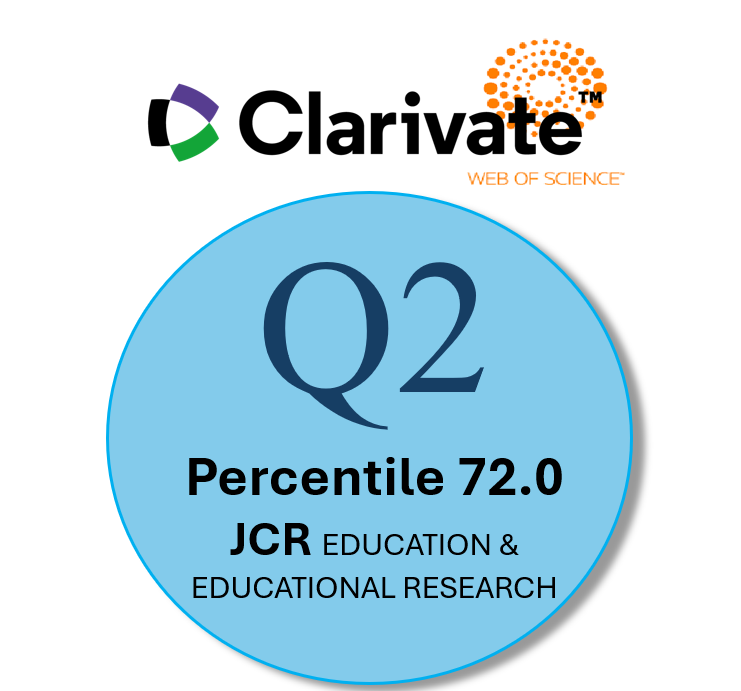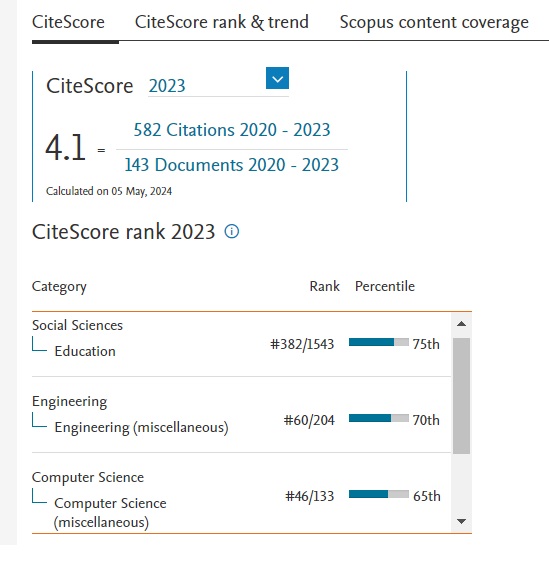El rendimiento académico universitario durante la pandemia. Un análisis comparativo entre las calificaciones y las percepciones del profesorado
Resumen
Se presentan los resultados obtenidos en un estudio empírico cuyos objetivos eran: a) analizar las calificaciones académicas del alumnado obtenidas en el periodo pandémico y compararlas con las de cursos anteriores en una misma institución universitaria (Universidad de La Laguna) y, b) relacionar los resultados obtenidos del análisis de rendimiento (entendido como calificaciones) con las subjetividades o percepciones del profesorado (recogidas mediante cuestionario específico aplicado contingentemente a la pandemia). Se accedió a las calificaciones de todo el alumnado matriculado en másteres en los 3 cursos inmediatamente anteriores al de la pandemia (cursos 2016/17, 2017/18 y 2018/19), los del curso de la pandemia (2019/20) y el inmediatamente posterior (2020/21). Se constata un efecto “COVID-19” en las calificaciones académicas con diferencias significativas en el año 2019/20 frente a anteriores años, con tendencia a recuperar lo preexistente a partir del curso 2020/21, pero difiere según la titulación. La constatación del efecto global y diferencial se matiza con el estudio complementario de las percepciones del profesorado. Se constatan percepciones distintas del profesorado según titulaciones acerca del efecto sobre el rendimiento académico, explicadas por diferentes apreciaciones de sus dificultades técnicas, el desarrollo de la docencia o la forma en que se implementó la evaluación.
Descargas
-
Resumen1532
-
PDF1557
Citas
Area-Moreira, M. (2021). La enseñanza remota de emergencia durante la COVID-19. Los desafíos postpandemia en la Educación Superior. Propuesta Educativa, 30 (56), pp. 57 – 70 https://propuestaeducativa.flacso.org.ar/wp-content/uploads/2022/04/REVISTA-56-Dossier-AREA-MOREIRA.pdf
Area, M.; Bethencourt, A.; Martín, S. y Sannicolás, B. (202). Análisis de las políticas de enseñanza universitaria en España en tiempos de Covid-19.La presencialidad adaptada. Revista Educación a Distancia (RED) Núm. 65, Vol. 21. Artíc. 3, 08-01-2021 https://doi.org/10.6018/red.450461
Bagur-Pons, S., Roselló-Ramón, M.R., Paz-Lourido, B., & Verger, S. (2021). El enfoque integrador de la metodología mixta en la investigación educativa. RELIEVE, 27(1), art. 3. https://revistaseug.ugr.es/index.php/RELIEVE/article/view/21053.
Bakhmat, L., Babakina, O., & Belmaz, Ya. (2021). Assessing online education during the COVID-19 pandemic: A survey of lecturers in Ukraine. 1840(1). https://doi.org/10.1088/1742-6596/1840/1/012050
Bond, M., Bedenlier, S., Marín, V. I., & Händel, M. (2021). Emergency remote teaching in higher education: Mapping the first global online semester. International Journal of Educational Technology in Higher Education, 18(1), 50. https://doi.org/10.1186/s41239-021-00282-x
Chung, J., McKenzie, S., Schweinsberg, A., & Mundy, M. E. (2022). Correlates of Academic Performance in Online Higher Education: A Systematic Review. Frontiers in Education, 7. https://doi.org/10.3389/feduc.2022.820567
Elsalem, L., Al-Azzam, N., Jum’ah, A. A., & Obeidat, N. (2021). Remote E-exams during Covid-19 pandemic: A cross-sectional study of students’ preferences and academic dishonesty in faculties of medical sciences. Annals of Medicine and Surgery, 62, 326-333. https://doi.org/10.1016/j.amsu.2021.01.054
Ewell, S. N., Josefson, C. C., & Ballen, C. J. (2022). Why Did Students Report Lower Test Anxiety during the COVID-19 Pandemic? Journal of Microbiology and Biology Education, 23(1). https://doi.org/10.1128/jmbe.00282-21
Fuchs, K. (2022). Online Learning and Emergency Remote Teaching in Higher Education during COVID-19: Student Perspectives. International Journal of Information and Education Technology, 12(9), 940-946. https://doi.org/10.18178/ijiet.2022.12.9.1704
Garcia, M. J., Miranda, P. G., & Romero, J. A. (2022). Analysis of information technologies and strategies in academic performance during the COVID-19 pandemic. Formacion Universitaria, 15(2), 139-150. https://doi.org/10.4067/S0718-50062022000200139
Garcia, M. J., Miranda, P. G., & Romero, J. A. (2022). Analysis of information technologies and strategies in academic performance during the COVID-19 pandemic. Formacion Universitaria, 15(2), 139-150. https://doi.org/10.4067/S0718-50062022000200139
García-Peñalvo, F. J., Corell, A., Abella-García, V., & Grande, M. (2020). La evaluación online en la educación superior en tiempos de la COVID-19. Education in the Knowledge Society (EKS), 21, 26-26. https://doi.org/10.14201/eks.23086
García-Prieto, F. J., Lopez-Aguilar, D., & Delgado-Garcia, M. (2022). Digital competence of university students and academic performance in times of COVID-19. Pixel-Bit, Revista de Medios y Educacion, 64, 165-199. https://doi.org/10.12795/pixelbit.91862
Ghosh, S., Pulford, S., & Bloom, A. J. (2022). Remote learning slightly decreased student performance in an introductory undergraduate course on climate change. Communications Earth and Environment, 3(1). https://doi.org/10.1038/s43247-022-00506-6
Hew, K. F., Jia, C., Gonda, D. E., & Bai, S. (2020). Transitioning to the “new normal” of learning in unpredictable times: Pedagogical practices and learning performance in fully online flipped classrooms. International Journal of Educational Technology in Higher Education, 17(1), 57. https://doi.org/10.1186/s41239-020-00234-x
Inoue, N., Aldosari, M., Park, S. E., & Ohyama, H. (2022). The impact of COVID-19 pandemic on student performance and self-evaluation in preclinical operative dentistry. European Journal of Dental Education, 26(2), 377-383. https://doi.org/10.1111/eje.12713
Ives, B. (2021). University students experience the COVID-19 induced shift to remote instruction. International Journal of Educational Technology in Higher Education, 18(1), 59. https://doi.org/10.1186/s41239-021-00296-5
Jephcote, C., Medland, E., & Lygo-Baker, S. (2021). Grade inflation versus grade improvement: Are our students getting more intelligent? Assessment and Evaluation in Higher Education, 46(4), 547-571. https://doi.org/10.1080/02602938.2020.1795617
Jorrín Abellán, I., Fontana Abad, M. y Rubia Avi, B. (Coord.) (2021). Investigar en Educación. Editorial Síntesis, Madrid.
Jung, I., Omori, S., Dawson, W. P., Yamaguchi, T., & Lee, S. J. (2021). Faculty as reflective practitioners in emergency online teaching: An autoethnography. International Journal of Educational Technology in Higher Education, 18(1), 30. https://doi.org/10.1186/s41239-021-00261-2
Karadag, E. (2021). Effect of COVID-19 pandemic on grade inflation in higher education in Turkey. PLoS ONE, 16(8 August). https://doi.org/10.1371/journal.pone.0256688
Karalar, H., Kapucu, C., & Gürüler, H. (2021). Predicting students at risk of academic failure using ensemble model during pandemic in a distance learning system. International Journal of Educational Technology in Higher Education, 18(1), 63. https://doi.org/10.1186/s41239-021-00300-y
Keržič, D., Alex, J. K., Alvarado, R. P. B., da Silva Bezerra, D., Cheraghi, M., Dobrowolska, B., Fagbamigbe, A. F., Faris, M. E., França, T., González-Fernández, B., Gonzalez-Robledo, L. M., Inasius, F., Kar, S. K., Lazányi, K., Lazăr, F., Machin-Mastromatteo, J. D., Marôco, J., Marques, B. P., Mejía-Rodríguez, O., Aristovnik, A. (2021). Academic student satisfaction and perceived performance in the e-learning environment during the COVID-19 pandemic: Evidence across ten countries. PLoS ONE, 16(10 October 2021). https://doi.org/10.1371/journal.pone.0258807
Lee, J., & Jung, I. (2021). Instructional changes instigated by university faculty during the COVID-19 pandemic: The effect of individual, course and institutional factors. International Journal of Educational Technology in Higher Education, 18(1), 52. https://doi.org/10.1186/s41239-021-00286-7
Mahasneh, O. M., Ayasrah, M. N., Yahyaa, S. M., & Al-Mrazeg, E. A. (2022). Educational implications of distance learning within the coronavirus pandemic (COVID-19) from the point of view of university students. World Journal on Educational Technology: Current Issues, 14(3), 655-670. https://doi.org/10.18844/wjet.v14i3.7199
Martín Ayala, J. L., Castaño Castaño, S., Hernández Santana, A., Martí González, M., & Brito Ballester, J. (2021). Impact of learning in the covid-19 era on academic outcomes of undergraduate psychology students. Sustainability (Switzerland), 13(16). https://doi.org/10.3390/su13168735
Montenegro-Rueda, M., Luque-de la Rosa, A., Sarasola Sánchez-Serrano, J. L., & Fernández-Cerero, J. (2021). Assessment in Higher Education during the COVID-19 Pandemic: A Systematic Review. Sustainability, 13(19), 10509. https://doi.org/10.3390/su131910509
Nachouki, M., & Naaj, M. A. (2022). Predicting Student Performance to Improve Academic Advising Using the Random Forest Algorithm. International Journal of Distance Education Technologies, 20(1). https://doi.org/10.4018/IJDET.296702
Ortega Ortigoza, D., Rodríguez Rodríguez, J., Mateos Inchaurrondo, A., (2021). Educación superior y la COVID-19: Adaptación metodológica y evaluación online en dos universidades de Barcelona. Revista Digital de Investigación en Docencia Universitaria, 15(1). https://doi.org/10.19083/ridu.2021.1275
Pardo-Merino, A., & Ruiz-Díaz, M. Á. (2012). Análisis de datos en ciencias sociales y de la salud III. https://dialnet.unirioja.es/servlet/libro?codigo=570218
Pérez, C. y Santín, D. (2007). Minería de Datos: Técnicas y Herramientas. Ediciones Paraninfo, S.A.
Prabu, M., Srivastava, K., Sharma, V. K., & Prabakar, D. D. (2022). Evaluation and semantic approach for student performance prediction using data mining techniques. 2405. https://doi.org/10.1063/5.0087368
Prado, M. G. de, Peñalvo, F. J. G., Almuzara, A. C., & García, V. A. (2021). Evaluación en Educación Superior durante la pandemia de la COVID-19. Campus Virtuales, 10(1), 49-58.
Rodríguez-Planas, N. (2022). COVID-19, college academic performance, and the flexible grading policy: A longitudinal analysis. Journal of Public Economics, 207. https://doi.org/10.1016/j.jpubeco.2022.104606
Román-Mendoza, E. (2020). La evaluación del profesorado universitario en tiempos de pandemia: Sistemas online de gestión de encuestas de satisfacción estudiantil. Campus Virtuales, 9(2), 61-70.
Rudenko, Y., Rozumenko, A., Kryvosheya, T., Karpenko, O., & Semenikhina, O. (2021). Online Training during the COVID-19 Pandemic: Analysis of Opinions of Practicing Teachers in Ukraine. 626-630. https://doi.org/10.23919/MIPRO52101.2021.9596799
Hodges,C., Moore,S., Lockee,B., Trust,T., Bond,A. (2022) The Difference Between Emergency Remote Teaching and Online Learning. Recuperado 18 de agosto de 2022, de https://er.educause.edu/articles/2020/3/the-difference-between-emergency-remote-teaching-and-online-learning
Vital-López, L., García-García, R., Rodríguez-Reséndíz, J., Paredes-García, W. J., Zamora-Antuñano, M. A., Oluyomi-Elufisan, T., Reséndiz, H. R., Sánchez, A. R. Á., & Cruz-Pérez, M. A. (2022). The Impacts of COVID-19 on Technological and Polytechnic University Teachers. Sustainability (Switzerland), 14(8). https://doi.org/10.3390/su14084593
Yaseen, H., Alsoud, A. R., Nofal, M., Abdeljaber, O., & Al-Adwan, A. S. (2021). The Effects of Online Learning on Students’ Performance: A Comparison between UK and Jordanian Universities. International Journal of Emerging Technologies in Learning, 16(20), 4-18.https://doi.org/10.3991/ijet.v16i20.24131
York, T. T., Gibson, C., & Rankin, S. (2015). Defining and Measuring Academic Success. Practical Assessment, Research & Evaluation, 20, 5.
Zheng, M., Bender, D., & Lyon, C. (2021). Online learning during COVID-19 produced equivalent or better student course performance as compared with pre-pandemic: Empirical evidence from a school-wide comparative study. BMC Medical Education, 21(1), 495. https://doi.org/10.1186/s12909-021-02909-z
Derechos de autor 2023 Revista de Educación a Distancia (RED)

Esta obra está bajo una licencia internacional Creative Commons Atribución-NoComercial 4.0.
Las obras que se publican en esta revista están sujetas a los siguientes términos:
1. El Servicio de Publicaciones de la Universidad de Murcia (la editorial) conserva los derechos patrimoniales (copyright) de las obras publicadas, y favorece y permite la reutilización de las mismas bajo la licencia de uso indicada en el punto 2.
2. Las obras se publican en la edición electrónica de la revista bajo una licencia Creative Commons Reconocimiento-NoComercial-SinObraDerivada 3.0 España (texto legal). Se pueden copiar, usar, difundir, transmitir y exponer públicamente, siempre que: i) se cite la autoría y la fuente original de su publicación (revista, editorial y URL de la obra); ii) no se usen para fines comerciales; iii) se mencione la existencia y especificaciones de esta licencia de uso.
3. Condiciones de auto-archivo. Se permite y se anima a los autores a difundir electrónicamente las versiones pre-print (versión antes de ser evaluada) y/o post-print (versión evaluada y aceptada para su publicación) de sus obras antes de su publicación, ya que favorece su circulación y difusión más temprana y con ello un posible aumento en su citación y alcance entre la comunidad académica. Color RoMEO: verde.














